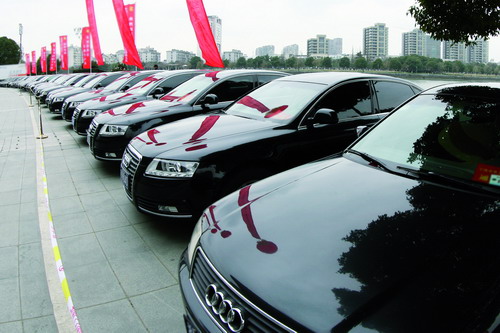Govt to limit car purchases to domestic brands
Updated: 2012-03-01 08:00
By Li Fangfang (China Daily)
|
|||||||||||
BEIJING - The Chinese government's plan to remove foreign brands from the list of vehicles it plans to buy will certainly give domestic automakers a boost in the future even though it may not have immediately significant effects, analysts said.
 |
|
Official cars at a government office in Zhejiang province are all foreign-brand vehicles. The central government plans to restrict the purchase of official vehicles to domestic brands. Zhang Heping / For China Daily |
The Ministry of Industry and Information Technology on Friday issued a preliminary list of 412 vehicle models that government offices are allowed to buy this year. For the first time, the document limits the purchases to domestic brands and excludes some vehicle types commonly bought in previous years, such as the German luxury brand Audi.
The public will be able to air their views through the ministry's website or through other means on the preliminary list until March 9, the ministry said.
"This milestone change clearly shows the Chinese government's strong determination to support domestic automakers," said Yao Hongguang, an auto analyst with Huatai United Securities Co Ltd. "Yet, according to our estimations, this turnaround plan will directly spur sales of Chinese-branded vehicles by only 2 percent this year.
"The models on the list are from China's major homegrown brands, of which 2.89 million units were sold in 2011," Yao said. "More importantly, the models make up about 75 percent of the sales of domestic brands and close to 25 percent of China's vehicle market."
Statistics show that almost 90 percent of the vehicles the government bought before 2010 were of foreign brands, the products of joint ventures. With the government's support of domestic brands, the figure decreased to almost 80 percent in the first half of 2011.
Yao said he believes the central government will adopt more policies to encourage the development of local brands during the country's 12th Five-Year Plan (2011-15).
In 2012, China is expected to spend about 120 billion yuan ($19 billion) on official cars. That means if every vehicle it buys costs the maximum allowed amount of 180,000 yuan, it will add about 670,000 vehicles to its fleet.
Namrita Chow, senior analyst with the consulting firm IHS Automotive, said she is worried "the new preliminary list fails to specify whether all levels of government will be forced to follow the mandate and buy cars made by local automakers. And similarly, the new plan fails to mention if governments at all levels are limited by the price cap per vehicle (of 180,000 yuan), which was issued last year".
"If there are no strict penalties or regulations forcing all levels of the government to comply, it is likely that ministers will still want a long-wheel base Audi and will find a way to get what their predecessors already have," Chow said. "Unless clear policies are imposed across all levels of the government, the effect on foreign brands such as Audi will be small."
Li Yuheng of Guosen Securities agreed with Chow that the new policy will be an essential part of the Chinese government's work to support domestic brands.
"The effect seems to be limited to the joint-venture brands," Li said. "Even so, it will give struggling homegrown brands confidence to further develop amid fierce competition with their foreign rivals."
In 2011, domestic automakers' market share in China, the largest in the world, decreased by 1.5 percentage points to reach 30.9 percent.
Jin Yibo, spokesman of Chery Automobile Co, said he hopes the government's decision to take a lead in buying Chinese brands will help improve the sales of Chery and other domestic brands.
Yang Xueliang, Zhejiang Geely Holdings Group Co's public relations director, said domestic brands should not stake their entire future on government policies.
"Improving one's competitive advantages, including quality and branding, should be the goal," said Yang.
Related Stories
Vehicle production in Brazil hits record high 2010-12-07 12:23
RV stores to open in Hangzhou 2011-09-21 17:32
Investment vehicle for the new rich 2011-06-17 11:01
Passenger vehicle sales figures soar 2010-12-08 07:58
- Govt to limit car purchases to domestic brands
- AVIC builds engine center with investment of $1.3b
- HSBC opens 25th branch on mainland
- Knowledge 'key' to Shanghai's future
- Shanghai explains housing rule 're-explanation'
- China's PMI rises to 51% in Feb
- Café offers more than just a cuppa
- BOC, CME to seek wider use of yuan








